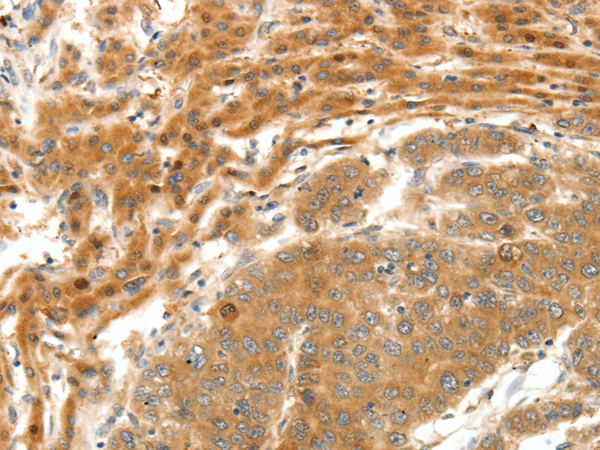

| WB | 咨询技术 | Human,Mouse,Rat |
| IF | 咨询技术 | Human,Mouse,Rat |
| IHC | 1/25-1/100 | Human,Mouse,Rat |
| ICC | 技术咨询 | Human,Mouse,Rat |
| FCM | 咨询技术 | Human,Mouse,Rat |
| Elisa | 1/1000-1/5000 | Human,Mouse,Rat |
| Aliases | PAI; PAI1; PAI-1; PLANH1 |
| Host/Isotype | Rabbit IgG |
| Antibody Type | Primary antibody |
| Storage | Store at 4°C short term. Aliquot and store at -20°C long term. Avoid freeze/thaw cycles. |
| Species Reactivity | Human, Rat |
| Immunogen | Fusion protein of human SERPINE1 |
| Formulation | Purified antibody in PBS with 0.05% sodium azide and 50% glycerol. |
+ +
以下是3-4条关于SERPINE1(PAI-1)抗体的参考文献概括:
---
1. **文献名称**:*"SERPINE1 promotes tumor progression and resistance to anti-angiogenic therapy in glioblastoma"*
**作者**:Li et al. (2022)
**摘要**:研究利用SERPINE1抗体分析其在胶质母细胞瘤中的表达,发现高表达SERPINE1与血管生成异常和抗血管治疗耐药性相关,提示其作为治疗靶点的潜力。
---
2. **文献名称**:*"A novel monoclonal antibody targeting SERPINE1 inhibits fibrosis in experimental models"*
**作者**:Zhang et al. (2020)
**摘要**:开发了一种特异性抗SERPINE1单克隆抗体,在肺纤维化小鼠模型中验证其抑制纤维化的效果,表明抗体通过阻断TGF-β/SERPINE1通路发挥作用。
---
3. **文献名称**:*"Dual role of SERPINE1 in tumor metastasis: Insights from antibody-based functional studies"*
**作者**:Smith et al. (2019)
**摘要**:通过免疫组化和Western blot分析,揭示SERPINE1在促进肿瘤细胞侵袭和抑制纤溶酶活性中的双重作用,抗体实验支持其在转移微环境中的复杂调控机制。
---
4. **文献名称**:*"PAI-1 antibody improves insulin sensitivity in a diet-induced obesity model"*
**作者**:Yamauchi et al. (2021)
**摘要**:研究发现SERPINE1抗体通过抑制脂肪组织炎症和改善胰岛素信号通路,缓解肥胖相关的代谢紊乱,为代谢综合征治疗提供新策略。
---
以上文献覆盖了SERPINE1抗体在肿瘤、纤维化、代谢疾病等领域的应用,涉及机制研究和治疗潜力验证。如需具体文章链接或补充信息,可进一步说明。
The SERPINE1 antibody targets the protein encoded by the SERPINE1 gene, also known as plasminogen activator inhibitor-1 (PAI-1). SERPINE1 is a key regulator of fibrinolysis, primarily inhibiting tissue-type and urokinase-type plasminogen activators (tPA and uPA), which convert plasminogen to plasmin. This serine protease inhibitor plays a critical role in balancing extracellular matrix remodeling, cell migration, and wound healing. Dysregulation of SERPINE1 is linked to pathological conditions, including thrombosis, fibrosis, cardiovascular diseases, and cancer metastasis, where its overexpression correlates with poor prognosis.
SERPINE1 antibodies are widely used in research to study its expression, localization, and function in tissues or cell lines. They are essential tools in techniques like Western blotting, immunohistochemistry (IHC), and ELISA to quantify SERPINE1 levels in biological samples. Polyclonal and monoclonal antibodies are available, often validated for specificity using knockout models or siRNA knockdown. Researchers also employ these antibodies to explore SERPINE1's role in signaling pathways, such as TGF-β and Wnt, and its interaction with vitronectin or integrins.
In clinical contexts, SERPINE1 antibodies aid in biomarker studies for diseases like atherosclerosis, diabetes, and fibrosis. Their utility extends to drug development, particularly for therapies targeting SERPINE1 to modulate fibrinolysis or inhibit cancer progression.
×